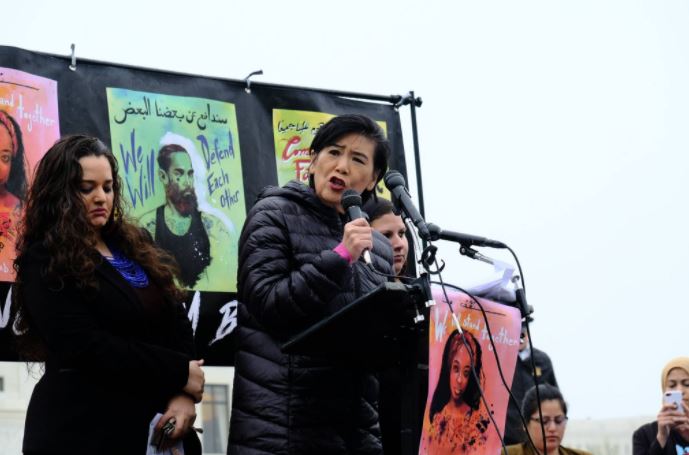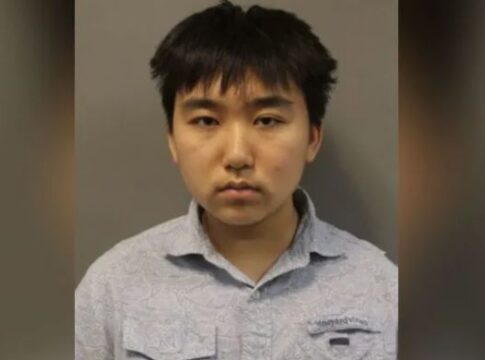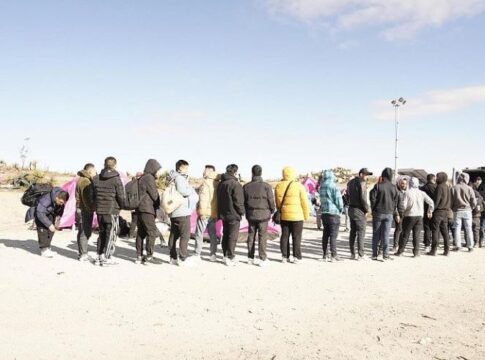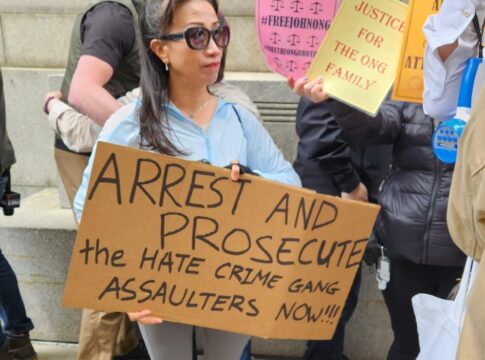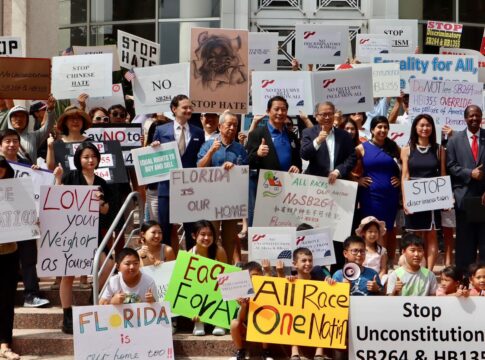Photo Credit: Imrul Islam and South Asian Americans Leading Together! Representative Judy Chu, alongside our allies Darakshan Raja and Maha Hilal (both from Justice for Muslims Collective), speaking at a #NoMuslimBanEver protest outside the Supreme Court in 2018.
By Shruti Rajkumar, AsAmNews Intern
Actress and activist Nikita Chaudhry grew up very observant of the ways in which people are made to feel different and inferior, which drew her to advocacy work. Now, she serves as a Board Member of South Asian Americans Leading Together (SAALT), which advocates for structural change and racial justice within the South Asian American community and beyond.
“The enemy is White supremacy for all of us. The ways in which history has allowed for us to not work in solidarity has actually benefited the same White supremacy. In order for us to actually make a difference is to work against the ways in which society has set our communities of color against one another and form bridges and be in solidarity,” Chaudhry said.
On March 16, eight people—including six Asian women— were killed by a gunman at three spas in Atlanta, Georgia. The shooting occurred amid a rise of anti-Asian attacks and hate crimes that coincided with the COVID-19 pandemic and former President Donald Trump’s comments that blamed the outbreak on China, according to USA Today.
LATEST STORIES
Even though these recent hate crimes have targeted specific Asian communities, South and East Asians have come together to support one another and collectively spread awareness about these acts of racism and xenophobia.
“I do think that this is something that is attacking people from all ends and from all demographics. If we look at the attacks that happened in Atlanta, maybe this is affecting people that are working class more, [or] this is affecting women more. There are so many intricacies and intersections that we have to acknowledge, while also standing up for the general, larger, broader community knowing that it will affect all of us at some point, if it has not already,” Chaudhry said.
Co-executive director for Chinese for Affirmative Action (CAA) Cynthia Choi said that anti-Asian racism and violence is not new. The recognition of the parallels between these extreme forms of violence, however, has resulted in acts of solidarity, support, and empathy within the Asian American movement, which Choi believes will help people heal and address these issues in the long run. While the recent hate crimes have been a galvanizing moment, she believes it is also a time to uplift other forms of violence and underinvestment within the Asian American community.
“We have joined together during this time because it affects all of us. But we can’t set aside the fact that there are forms of violence that affect the Asian American community that have not gotten the attention that it deserves. For example, the ongoing racial profiling of Muslims and South Asians…the prison to deportation pipeline that’s affecting the South Asian community,” said Choi.
Executive director of Asian Pacific Policy and Planning Council (A3PCON) Manju Kulkarni said that there have been incident reports on Stop AAPI Hate from South Asian Americans. She recalls one reported incident in which a South Asian person, who was speaking to their sister in Urdu while at a library, and was confronted by a woman who said “Get away from me! You people were the ones who started this!”
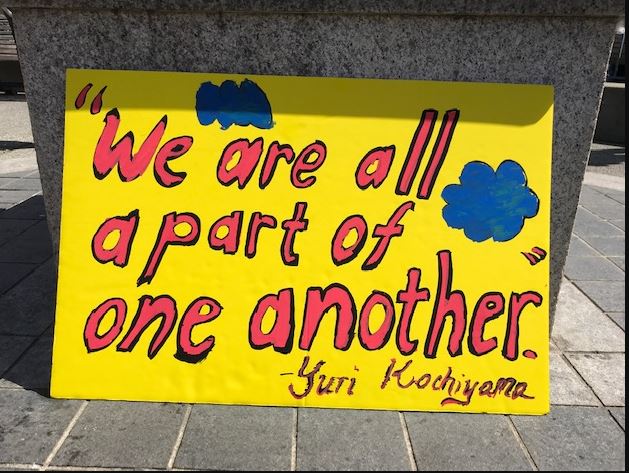
Although there are commonalities and differences within the Asian Pacific Islander identity, Kulkarni said that the recent hate is an issue that impacts all.
“In terms of [my] two positions, it’s both having the South Asian lens as well as the broader lens of how things impact APIs,” Kulkarni said. “The reason to join under this banner [of solidarity] is really a collective organizing principle. How can we have more power, and how can we work in unison, on essentially issues that impact us all?”
Kulkarni is also the co-founder of Stop AAPI Hate, which she created with Choi and San Francisco State University professor Russell Jeung. She said that between the three of them, there is a strong sense of solidarity.
“I think us coming together, working on these issues together, and really thinking about what it means to collaborate and how we’re looking at these issues broadly…I think that’s sort of where our solidarity comes, is that day to day work that we’re doing,” Kulkarni said.
Kulkarni recalls how commonalities between East and South Asian communities drove solidarity after 9/11, particularly between Japanese Americans and Muslim communities with the creation of an organization called Vigilant Love. According to the ACLU’s Sanctioned Bias: Racial Profiling Since 9/11 Report, after 9/11 it was the United States’ official policy to stop, interrogate, and detain individuals without criminal charge. This often occurred for long periods of time on the basis of their national origin, ethnicity, religion, and skin color, which specifically impacted the country’s Arab, Muslim, and South Asian communities.
“Some of the people in Vigilant Love are also older Japanese folks who fought for redress for Japanese Americans. I think having experienced incarceration in their communities in the 1940s, during World War II, they were able to recognize and appreciate the targeting of Americans after 9/11. They’ve come together…thinking of the commonality [and] how can they organize and advocate against what was happening,” Kulkarni said.
After the Muslim ban, Chinese and Japanese communities (as well as other Asians) came together to protest because they knew what that experience is like, Choi said. For example, Japanese Americans have been painted as existential threats to U.S. national security in the same way that Muslim and Sikh communities have been.
“These are all issues that the Asian community has directly experienced. In times of crisis, there is an opportunity to shine a light on extreme forms of violence, including policies that were anti-Muslim, the Muslim ban, the erosion of civil liberties, the ramping up surveillance and racial profiling,” Choi said.
Solidarity is extremely important, especially when a community feels like they’re under attack or under siege, said Choi. South Asians are a part of multiethnic organizations, networks, and coalitions around the country, and Choi said that having those deep relationships have allowed for the Asian American community to work together in times of crisis.
Chinese Digital Engagement Program manager at CAA Jinxia Niu said that she has noticed a similar sense of solidarity, especially between progressive voices within South and East Asian communities. She credits Vice President Kamala Harris for using her position and identity as an Asian American to encourage this unity in a time of crisis.
“That is a powerful voice. I surely heard much more positive and voice in support from other Indian and other South Asian American communities as well. I think in general we should really fight White supremacy and the systems in discrimination to each other to ensure that every community and every member of communities of color can feel safe and supported. This narrative is also powerful. I think there is solidarity there,” Niu said.
Chaudhry believes that there is a strength in number with Asian solidarity, which can result in what she calls transformative visibility, particularly as it pertains to media, entertainment, and politics. This includes the sharing of more stories, narratives, depth, nuances, and intricacies within the community, while also acknowledging issues that are pertinent to the Asian community and specific communities within that.
“I’m also hoping with solidarity and coalition building, that there is a push towards a very healing-centered version of justice that looks out for all of us, and not just one of us, and not just those of most assimilated or closest to whiteness. It’s like, ‘Okay, how can we form coalitions that we can continue to depend on one another, and have less and less use of the systems of White supremacy that are actually killing us?'” Chaudhry said. “In the world, those hate crimes are happening, so knowing that, if we stand up for our neighbors, our neighbors will be there for us.”
AsAmNews has Asian America in its heart. We’re an all-volunteer effort of dedicated staff and interns. Check out our new Instagram account. Go to our Twitter feed and Facebook page for more content. Please consider interning, joining our staff, or submitting a story.


